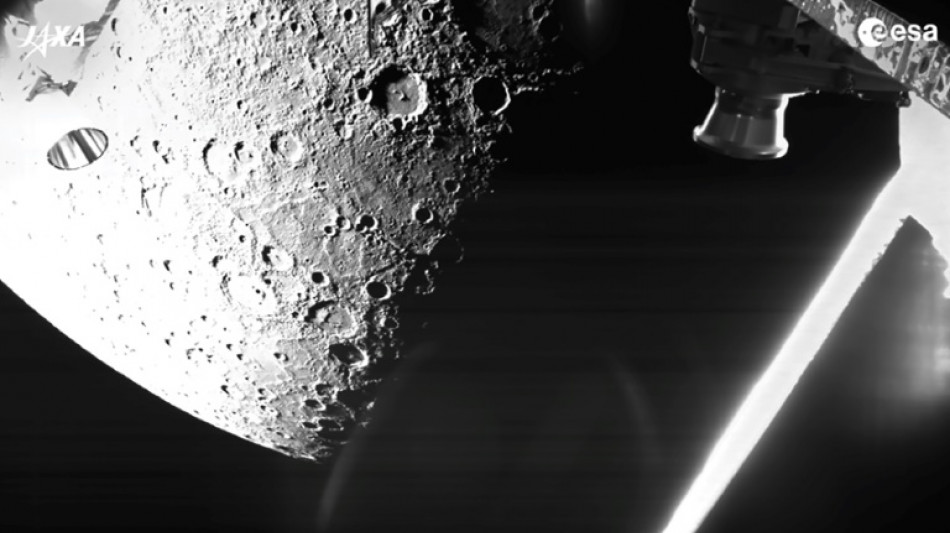
-
 Palestinians welcome ICC arrest warrants for Israeli officials
Palestinians welcome ICC arrest warrants for Israeli officials
-
Senegal ruling party wins parliamentary majority: provisional results

-
 Fiji's Loganimasi in for banned Radradra against Ireland
Fiji's Loganimasi in for banned Radradra against Ireland
-
New proposal awaited in Baku on climate finance deal

-
 Brazil police urge Bolsonaro's indictment for 2022 'coup' plot
Brazil police urge Bolsonaro's indictment for 2022 'coup' plot
-
NFL issues security alert to teams about home burglaries

-
 Common water disinfectant creates potentially toxic byproduct: study
Common water disinfectant creates potentially toxic byproduct: study
-
Chimps are upping their tool game, says study

-
 US actor Smollett's conviction for staged attack overturned
US actor Smollett's conviction for staged attack overturned
-
Fears rise of gender setbacks in global climate battle

-
 'World's best coach' Gatland 'won't leave Wales' - Howley
'World's best coach' Gatland 'won't leave Wales' - Howley
-
Indian PM Modi highlights interest in Guyana's oil

-
 Israel strikes kill 22 in Lebanon as Hezbollah targets south Israel
Israel strikes kill 22 in Lebanon as Hezbollah targets south Israel
-
Argentina lead Davis Cup holders Italy

-
 West Bank city buries three Palestinians killed in Israeli raids
West Bank city buries three Palestinians killed in Israeli raids
-
Fairuz, musical icon of war-torn Lebanon, turns 90

-
 Jones says Scotland need to beat Australia 'to be taken seriously'
Jones says Scotland need to beat Australia 'to be taken seriously'
-
Stock markets push higher but Ukraine tensions urge caution

-
 IMF sees 'limited' impact of floods on Spain GDP growth
IMF sees 'limited' impact of floods on Spain GDP growth
-
Fresh Iran censure looms large over UN nuclear meeting

-
 Volkswagen workers head towards strikes from December
Volkswagen workers head towards strikes from December
-
'More cautious' Dupont covers up in heavy Parisian snow before Argentina Test

-
 UK sanctions Angola's Isabel dos Santos in graft crackdown
UK sanctions Angola's Isabel dos Santos in graft crackdown
-
Sales of existing US homes rise in October

-
 Crunch time: What still needs to be hammered out at COP29?
Crunch time: What still needs to be hammered out at COP29?
-
Minister among 12 held over Serbia station collapse

-
 Spurs boss Postecoglou hails 'outstanding' Bentancur despite Son slur
Spurs boss Postecoglou hails 'outstanding' Bentancur despite Son slur
-
South Sudan rejects 'malicious' report on Kiir family businesses

-
 Kyiv claims 'crazy' Russia fired nuke-capable missile
Kyiv claims 'crazy' Russia fired nuke-capable missile
-
Australia defeat USA to reach Davis Cup semis

-
 Spain holds 1st talks with Palestinian govt since recognising state
Spain holds 1st talks with Palestinian govt since recognising state
-
Stock markets waver as Nvidia, Ukraine tensions urge caution

-
 Returning Vonn targets St Moritz World Cup races
Returning Vonn targets St Moritz World Cup races
-
Ramos nears PSG return as Sampaoli makes Rennes bow

-
 Farrell hands Prendergast first Ireland start for Fiji Test
Farrell hands Prendergast first Ireland start for Fiji Test
-
Gaza strikes kill dozens as ICC issues Netanyahu arrest warrant

-
 Famed Berlin theatre says cuts will sink it
Famed Berlin theatre says cuts will sink it
-
Stuttgart's Undav set to miss rest of year with hamstring injury

-
 Cane, Perenara to make All Blacks farewells against Italy
Cane, Perenara to make All Blacks farewells against Italy
-
Kenya scraps Adani deals as Ruto attempts to reset presidency

-
 French YouTuber takes on manga after conquering Everest
French YouTuber takes on manga after conquering Everest
-
Special reunion in store for France's Flament against 'hot-blooded' Argentina

-
 'World of Warcraft' still going strong as it celebrates 20 years
'World of Warcraft' still going strong as it celebrates 20 years
-
Fritz pulls USA level with Australia in Davis Cup quarters

-
 New Iran censure looms large over UN nuclear meeting
New Iran censure looms large over UN nuclear meeting
-
The first 'zoomed-in' image of a star outside our galaxy

-
 ICC issues arrest warrants for Netanyahu, Gallant, Deif
ICC issues arrest warrants for Netanyahu, Gallant, Deif
-
Minister among 11 held over Serbia station collapse

-
 Historic gold regalia returned to Ghana's king
Historic gold regalia returned to Ghana's king
-
Kyiv accuses Russia of launching intercontinental ballistic missile attack


Spacecraft flies closer to Mercury than planned after thruster glitch
A spacecraft carrying European and Japanese probes passed closer to Mercury than originally planned overnight after thruster problems delayed the mission to study the little-known, Sun-scorched planet.
The BepiColombo mission launched in 2018 on a winding path that had been intended to enter the orbit of the planet closest to the Sun in December 2025.
But in April, a glitch with the spacecraft's thrusters sapped some of its power supply, forcing teams on the ground to change its trajectory and delaying its arrival until November 2026.
The new path meant the spacecraft needed to fly 35 kilometres (22 miles) closer to the planet than initially planned -- passing just 165 kilometres above the surface -- during its latest flyby.
The European Space Agency's operations team confirmed that "all went well" with the flyby overnight, the mission's account on X said on Thursday.
It also posted a new image taken by the probe of the planet, whose pockmarked surface resembles the Moon.
It was the fourth of six planned flybys of Mercury on the mission's nine-billion-kilometre journey before it can finally settle into the planet's orbit.
Most of the time Mercury is closer to Earth than Mars -- but the red planet can be reached by missions from Earth in just seven months.
Mercury is "the most difficult" planet for probes to reach, explained Paris Observatory astronomer Alain Doressoundiram.
The planet's relatively tiny mass -- it is only slightly bigger than the Moon -- means its gravitational pull is extremely weak compared to the Sun, making it tricky for satellites to stay in its orbit.
"It takes much more energy to brake and stop at Mercury than to go to Mars," Doressoundiram told AFP.
This is where delicate manoeuvres called gravitational assists come in. These slingshots around celestial bodies allow spacecraft to speed up, slow down, or change trajectory.
The glitch with the electric thrusters means the spacecraft is now operating with only 90 percent of its planned power supply.
After months spent investigating the problem, the thrusters will "remain operating below the minimum thrust required for an insertion into orbit around Mercury in December 2025," mission manager Santa Martinez said in a statement earlier this week.
The new slower path means BepiColombo is now planned to enter orbit in November 2026.
- Space 'oddities' -
Mercury is by far the least studied of the four rocky, innermost planets in our solar system, which also include Venus, Earth and Mars.
NASA's Mariner 10 was the first probe to capture a close picture of its lunar-looking surface in 1974.
No spacecraft had orbited the planet until the MESSENGER probe arrived in 2011.
The NASA mission confirmed "some rather bizarre things," said Doressoundiram, a specialist on the surfaces of planets.
One of these "oddities" is that Mercury is the only rocky planet other than Earth to have a magnetic field, Doressoundiram said. Exactly how it has such a magnetic field so close to the Sun is not fully understood.
Another "oddity" is that Mercury's iron core composes 60 percent of its mass -- compared to only a third for Earth.
Mercury's surface is also marked by "hollows," which could suggest relatively recent geologic activity.
Also unclear is the composition of minerals on covering the planet's surface, which is blasted with intense radiation from the Sun.
These are just some of the mysteries that the BepiColombo mission hopes to shed light on when it finally orbits Mercury for at least a year and a half.
The spacecraft carries two separate satellites, one from the ESA and another from Japan's JAXA space agency, which have a total of 16 scientific instruments.
P.Anderson--BTB

